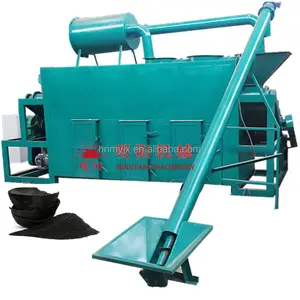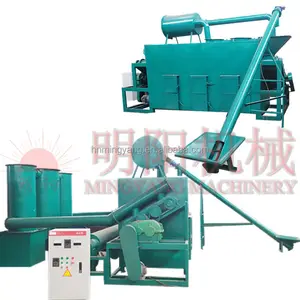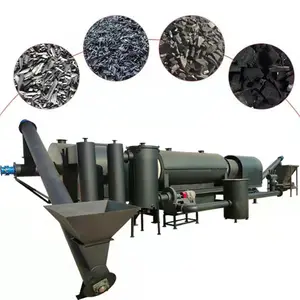The biochar machine is an advanced device engineered to transform organic matter into biochar, a form of charcoal that bolsters soil fertility and captures carbon. Through pyrolysis, this machine thermally decomposes organic material at elevated temperatures in a controlled, low-oxygen setting. Biochar is lauded for its role in enhancing soil structure, moisture retention, and agricultural productivity. Alibaba.com offers an array of biochar machines to serve the demands of both manufacturing facilities and agricultural enterprises.
Types of Biochar Machines
Variety abounds within the realm of biochar machines, with models tailored to diverse operational requirements and scales. The mobile biochar machine boasts portability, making it suitable for small-scale endeavors or on-the-spot production. In contrast, stationary biochar machines are equipped to process substantial biomass quantities. Certain machines are fine-tuned for specific organic inputs like coconut shells or rice husks, maximizing the efficiency of pyrolysis for these materials. This assortment of machines ensures a fitting biochar solution for every context, from modest farms seeking soil enhancement to expansive agricultural enterprises pursuing ambitious carbon sequestration projects.
Structure of Biochar Machines
The biochar making machine consists of several critical components that collectively facilitate the conversion of biomass into biochar. The feedstock hopper introduces raw material into the system, which is then conveyed to the pyrolysis chamber for heating in an oxygen-free environment, triggering decomposition. The machine's heating system is intricately designed to sustain uniform temperatures, essential for effective pyrolysis. Evolved gases are channeled through a sequence of filters and coolers, purifying them for use or safe atmospheric release. The resultant solid, biochar, is gathered in a separate container, ready for application or additional processing.
Materials in Biochar Machines
A biochar machine manufacturer's choice of construction materials is driven by the need to endure the intense conditions of pyrolysis. Heat-resistant alloys or specialized ceramics often line the pyrolysis chamber, capable of withstanding extreme temperatures without deterioration. Insulation is equally vital, maintaining heat within the chamber to boost energy efficiency. The robustness of these materials is not merely a performance issue but also a safety concern, as they confine the high-temperature processes within the apparatus.
Business Usages and Applications
The mobile biochar machine has carved a niche in various commercial arenas, particularly in agriculture, where it produces a powerful soil enhancer. In the manufacturing sector, biochar serves as a filtration medium in water and air purification systems, thanks to its adsorptive qualities. The environmental field utilizes biochar for carbon sequestration initiatives, contributing to the mitigation of carbon emissions. Each application not only promotes sustainability but also generates new income avenues for enterprises engaged in biochar production or application.
Functions of Biochar Machines
While the primary role of a biochar machine is to convert biomass into biochar, its functionalities extend further. Numerous models are adept at reclaiming energy from the pyrolysis process in the form of syngas, which can be harnessed for heating or electricity, thereby enhancing the system's overall efficiency. The capacity to process a broad spectrum of organic materials, from wood chips to agricultural waste, underscores the adaptability of these machines.
Features of Portable Biochar Makers
Portable biochar makers stand out with their streamlined design, enabling effortless relocation and deployment across various sites. Despite their diminutive stature, they do not compromise on efficacy, often featuring cutting-edge technology such as automated temperature regulation and real-time monitoring systems. These attributes guarantee the consistent quality of biochar produced, irrespective of the setting or operator.
Benefits of Biochar Machines
Employing a biochar machine yields numerous advantages. Environmentally, it offers a carbon sequestration method and reduces organic waste volume. For agricultural stakeholders, biochar can lead to more robust soils and heightened farm output. Economically, the benefits span from diminished waste disposal expenses to the potential creation of a new revenue source through biochar sales and syngas utilization.
How to Use a Biochar Machine?
Effective operation of a biochar machine necessitates a grasp of the pyrolysis technique. Operators must ensure proper preparation and loading of biomass into the machine. Precise management of temperature and duration is critical to yielding high-quality biochar. Continuous monitoring throughout the pyrolysis is imperative for maintaining safety and operational efficacy.
How to Choose the Right Biochar Machine?
Selecting the right biochar machine entails assessing the scale of operations, the biomass type for processing, and the intended final product. Considerations should include energy efficiency, production capacity, and the degree of automation. Consultation with a biochar machine manufacturer can offer invaluable insight into choosing a machine that aligns with specific commercial objectives and requirements.
How to Maintain a Biochar Machine?
Meticulous maintenance is essential for the longevity and optimal performance of a biochar machine. This involves cleaning the feedstock hopper, examining the pyrolysis chamber, and maintaining the gas cleaning systems. Adhering to a maintenance regimen can avert operational setbacks and guarantee the machine's sustained peak functionality.
Alibaba.com is the marketplace where a diverse selection of biochar machines is available, ranging from compact, portable units to more extensive, fixed installations. With comprehensive product details and specifications, Alibaba.com simplifies the decision-making process for business purchasers, helping them identify the biochar production equipment that best suits their operational needs.












































 浙公网安备 33010002000092号
浙公网安备 33010002000092号 浙B2-20120091-4
浙B2-20120091-4